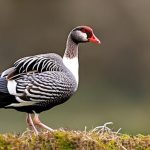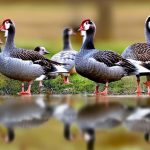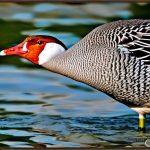Having a lakefront property is a dream for many people. The serene views, the calming sound of water, and the opportunity for various recreational activities make it an ideal place to live or vacation. However, owning a lakefront property also comes with its challenges, particularly when it comes to dealing with geese. In this blog post, we will discuss the behavior of geese, the risks they pose to lakefront properties, and various strategies to manage and deter them.
Key Takeaways
- Geese are social animals that mate for life and are protective of their young.
- Geese can cause property damage, create health hazards, and be aggressive towards humans.
- Physical barriers such as fences and netting can prevent geese from accessing certain areas.
- Visual deterrents like decoys and reflective tape can make geese feel uncomfortable and avoid an area.
- Sound deterrents like loud noises or predator calls can scare geese away.
Understanding the Behavior of Geese
Geese are social birds that are known for their distinctive honking sound and V-shaped flying formation. They are attracted to lakefront properties because they provide an ideal habitat for nesting and feeding. Lakes offer a source of water for drinking and bathing, while the surrounding grassy areas provide ample food supply in the form of grass, seeds, and insects.
Geese are highly territorial and will defend their nesting sites aggressively. They can become a nuisance when they gather in large numbers, leaving behind droppings that can be unsightly and pose health risks. Understanding their behavior is crucial in effectively managing them.
Identifying the Risks of Geese on Lakefront Property
While geese may seem harmless, they can pose several risks to lakefront properties. One of the main concerns is the damage they can cause to the landscape. Geese feed on grass and can quickly strip an area of its vegetation, leaving behind bare patches that are unsightly and difficult to restore.
Another risk is the health hazards associated with geese droppings. Their droppings contain bacteria that can contaminate water sources and pose a threat to human health. Additionally, the accumulation of droppings on walkways and docks can create slippery surfaces, increasing the risk of accidents.
Implementing Physical Barriers to Deter Geese
One effective way to deter geese from lakefront properties is by implementing physical barriers. These barriers can prevent geese from accessing certain areas, such as lawns and docks. Some common physical barriers include fences, netting, and floating barriers.
Fences can be installed around the perimeter of the property to create a physical barrier that prevents geese from entering. Netting can be used to cover specific areas, such as swimming pools or gardens, to keep geese away. Floating barriers, such as buoys or floating ropes, can be placed in the water to create a visual deterrent and prevent geese from landing.
While physical barriers can be effective in deterring geese, they may also have some drawbacks. Fences can be expensive to install and may not be aesthetically pleasing. Netting may require regular maintenance to ensure it remains effective. Floating barriers may need to be adjusted periodically to maintain their effectiveness.
Using Visual Deterrents to Keep Geese Away
Visual deterrents can also be used to keep geese away from lakefront properties. These deterrents rely on visual stimuli that make geese feel threatened or uncomfortable. Some common visual deterrents include scarecrows, reflective tape, and predator decoys.
Scarecrows can be placed in open areas to create the illusion of a human presence and scare away geese. Reflective tape can be hung from trees or poles to create flashes of light that deter geese. Predator decoys, such as plastic owls or coyotes, can be strategically placed to create the impression of a predator nearby.
Visual deterrents are relatively inexpensive and easy to implement. However, their effectiveness may diminish over time as geese become accustomed to them. Regularly moving or changing the position of visual deterrents can help maintain their effectiveness.
Applying Sound Deterrents to Scare Geese

Sound deterrents can be another effective way to scare geese away from lakefront properties. These deterrents use loud noises or sounds that mimic natural predators to create a sense of danger and encourage geese to leave. Some common sound deterrents include propane cannons, ultrasonic devices, and recorded predator calls.
Propane cannons produce loud bangs at regular intervals to startle geese and discourage them from staying in the area. Ultrasonic devices emit high-frequency sounds that are unpleasant to geese but not audible to humans. Recorded predator calls, such as those of hawks or eagles, can be played to create the illusion of a predator nearby.
Sound deterrents can be highly effective in scaring geese away, but they may also cause disturbance to humans and other wildlife. Propane cannons can be noisy and may not be suitable for residential areas. Ultrasonic devices may require regular maintenance and adjustment to ensure their effectiveness. Recorded predator calls may need to be changed periodically to prevent geese from becoming accustomed to them.
Removing Food Sources to Prevent Geese from Gathering
One of the most effective ways to prevent geese from gathering on lakefront properties is by removing their food sources. Geese are attracted to areas with abundant grass, seeds, and insects. By reducing or eliminating these food sources, you can discourage geese from staying in the area.
Regularly mowing the grass can make it less attractive to geese, as shorter grass is less nutritious for them. Removing weeds and other plants that produce seeds can also help reduce the food supply. Additionally, treating the area for insects can make it less appealing to geese.
It is important to note that removing food sources alone may not completely deter geese, especially if there are other attractive features on the property. Combining this strategy with other deterrent methods can increase its effectiveness.
Planting Natural Barriers to Keep Geese from Entering
Planting natural barriers can be an effective long-term solution for keeping geese from entering lakefront properties. These barriers can create physical obstacles that make it difficult for geese to access certain areas. Some common natural barriers include tall grasses, shrubs, and trees.
Tall grasses can be planted along the shoreline to create a physical barrier that prevents geese from landing. Shrubs and trees can be strategically placed to create dense vegetation that geese are less likely to penetrate. These natural barriers not only deter geese but also enhance the overall aesthetics of the property.
While natural barriers can be effective, they may require regular maintenance to ensure their effectiveness. Pruning and trimming may be necessary to prevent overgrowth and maintain the desired density. Additionally, it is important to choose native plants that are suitable for the local climate and soil conditions.
Creating Alternative Water Sources to Divert Geese Away
Creating alternative water sources can help divert geese away from lakefront properties. Geese are attracted to lakes because they provide a source of water for drinking and bathing. By providing alternative water sources away from the property, you can encourage geese to gather elsewhere.
Installing a small pond or birdbath in a less desirable area can attract geese and divert them away from the lakefront property. These alternative water sources should be regularly maintained to ensure they remain attractive to geese. It is important to note that this strategy may not completely eliminate geese from the property but can help reduce their presence.
Educating Neighbors and Visitors on the Importance of Geese Control
Educating neighbors and visitors on the importance of geese control is crucial in effectively managing geese on lakefront properties. Many people may not be aware of the risks associated with geese or the strategies available to deter them. By raising awareness and providing information, you can encourage others to take action and implement geese control measures.
One way to educate neighbors and visitors is by distributing informational brochures or flyers that highlight the risks of geese and the available deterrent methods. Posting signs or notices around the property can also help raise awareness. Additionally, organizing community meetings or workshops can provide an opportunity for discussion and sharing of experiences.
Seeking Professional Help for Effective Geese Management
In some cases, seeking professional help may be necessary for effective geese management on lakefront properties. Professionals who specialize in wildlife management or pest control can provide expert advice and assistance in implementing the most appropriate strategies for deterring geese.
Wildlife biologists or ecologists can assess the property and develop a customized management plan based on the specific needs and challenges. They can also provide guidance on obtaining necessary permits or licenses for certain deterrent methods. Pest control professionals can implement and maintain deterrent measures, ensuring their effectiveness over time.
Managing geese on lakefront properties can be challenging, but with the right strategies and techniques, it is possible to deter them effectively. Understanding the behavior of geese, identifying the risks they pose, and implementing various deterrent methods can help maintain a beautiful and enjoyable lakefront property. By taking action and implementing the tips mentioned in this blog post, you can create a peaceful and goose-free environment for yourself, your neighbors, and your visitors.
If you’re looking for effective ways to keep geese off your lakefront property, you might also be interested in learning about how to create a garden chicken coop. This article from Poultry Wizard provides valuable insights on setting up a coop that not only keeps your chickens safe but also helps deter geese from invading your property. With tips on chicken coop run plans and strategies to prevent geese from causing damage, this resource offers practical solutions for maintaining a peaceful and goose-free lakefront environment. To learn more, check out the article here.
FAQs
What are the common problems caused by geese on lakefront property?
Geese can cause damage to lawns, gardens, and landscaping. They can also leave behind large amounts of droppings, which can be unsightly and unsanitary. In addition, geese can be aggressive towards humans and pets, posing a potential safety risk.
What are some effective ways to keep geese off lakefront property?
Some effective ways to keep geese off lakefront property include using visual deterrents such as scarecrows or reflective tape, using noise deterrents such as loud noises or barking dogs, and using physical barriers such as fencing or netting. It is important to note that these methods may need to be combined for maximum effectiveness.
Are there any humane ways to keep geese off lakefront property?
Yes, there are humane ways to keep geese off lakefront property. These include using non-toxic repellents such as grape concentrate or using natural predators such as dogs or trained falcons. It is important to avoid using harmful or lethal methods, as these can be inhumane and may also be illegal.
What should I do if I encounter an aggressive goose?
If you encounter an aggressive goose, it is important to remain calm and avoid provoking the bird. Slowly back away from the goose and give it plenty of space. If the goose continues to be aggressive, seek assistance from a professional wildlife control expert.
Is it legal to harm or kill geese on lakefront property?
In most cases, it is illegal to harm or kill geese on lakefront property. Geese are protected under federal and state laws, and harming or killing them can result in fines or other legal consequences. It is important to use humane and non-lethal methods to keep geese off lakefront property.
Meet Walter, the feathered-friend fanatic of Florida! Nestled in the sunshine state, Walter struts through life with his feathered companions, clucking his way to happiness. With a coop that’s fancier than a five-star hotel, he’s the Don Juan of the chicken world. When he’s not teaching his hens to do the cha-cha, you’ll find him in a heated debate with his prized rooster, Sir Clucks-a-Lot. Walter’s poultry passion is no yolk; he’s the sunny-side-up guy you never knew you needed in your flock of friends!







